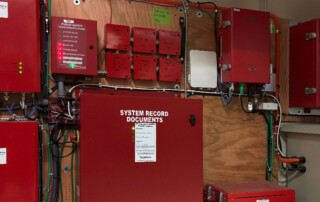In the world of logistics, efficient and secure communication is paramount. To address the challenges of modern logistics, private data networks have emerged as a powerful tool. These networks provide a dedicated infrastructure that ensures reliable connectivity and data transmission, making them the ideal solution for several logistics use cases. Private data networks provide enhanced security, dedicated bandwidth, control, scalability, and seamless integration, making them effective in supporting the complex and data-intensive processes involved in logistics management.
Let’s explore the technical aspects of logistics use cases that are best supported by a private data network.
Warehouse Automation
Private data networks provide the backbone for implementing advanced warehouse automation systems. By connecting various devices such as barcode scanners, RFID readers, and automated picking systems, logistics companies can achieve seamless coordination and real-time data exchange. This enables accurate inventory management, efficient order fulfillment, and the automated tracking of goods within the warehouse. The reliability and low latency of private networks ensure that operations remain uninterrupted, even in complex and fast-paced warehouse environments.
Supply Chain Visibility
One of the most critical aspects of logistics is end-to-end supply chain visibility. Private data networks enable secure and efficient communication between multiple stakeholders, including suppliers, manufacturers, distributors, and retailers. With a private network, logistics companies can track shipments, monitor inventory levels, and share real-time updates on delivery status. This level of transparency improves collaboration, enables proactive issue resolution, and ensures accurate demand forecasting. Private networks also provide an audit trail of data exchanges, aiding compliance and dispute resolution.
Cold Chain Management
Maintaining optimal temperature conditions is paramount in industries such as food and pharmaceuticals. Private data networks enable real-time monitoring of temperature, humidity, and other environmental factors within the cold chain. By integrating temperature sensors and control systems into the network, logistics companies can closely monitor and manage the conditions in which sensitive products are stored and transported. Immediate alerts can be triggered in case of deviations, allowing for prompt corrective actions and minimizing the risk of product spoilage.
Real-Time Asset Tracking
For logistics companies dealing with valuable assets, private networks offer robust solutions for asset tracking. By equipping assets with GPS trackers, sensors, and RFID tags connected to the network, companies can monitor their location, condition, and status in real time. This enables proactive maintenance, reduces the risk of theft or loss, and optimizes asset utilization. Private networks provide the necessary bandwidth and reliability to handle the continuous flow of asset data, ensuring accurate and up-to-date information for decision-making.
Fleet Management
Private networks play a crucial role in fleet management. By establishing a dedicated network, logistics companies can seamlessly communicate with their vehicles in real time. This enables precise tracking of vehicle location, speed, and performance metrics. With a private network, fleet managers can optimize routes, monitor fuel consumption, and proactively address maintenance issues. This level of connectivity and control leads to significant cost savings, improved operational efficiency, and enhanced driver safety.
Conclusions
In the realm of logistics, private data networks offer the best foundation for efficient and secure communication. From fleet management and warehouse automation to supply chain visibility, cold chain management, and asset tracking, the technical capabilities of private networks enable logistics companies to overcome operational challenges and streamline their processes. By leveraging the power of dedicated infrastructure, logistics providers can enhance their capabilities, reduce costs, improve customer satisfaction, and stay ahead in the ever-evolving logistics landscape.
To learn more about Pierson Wireless’ approach to logistics, visit our resource page. For more information on private data networks, check out the following link.























Leave A Comment